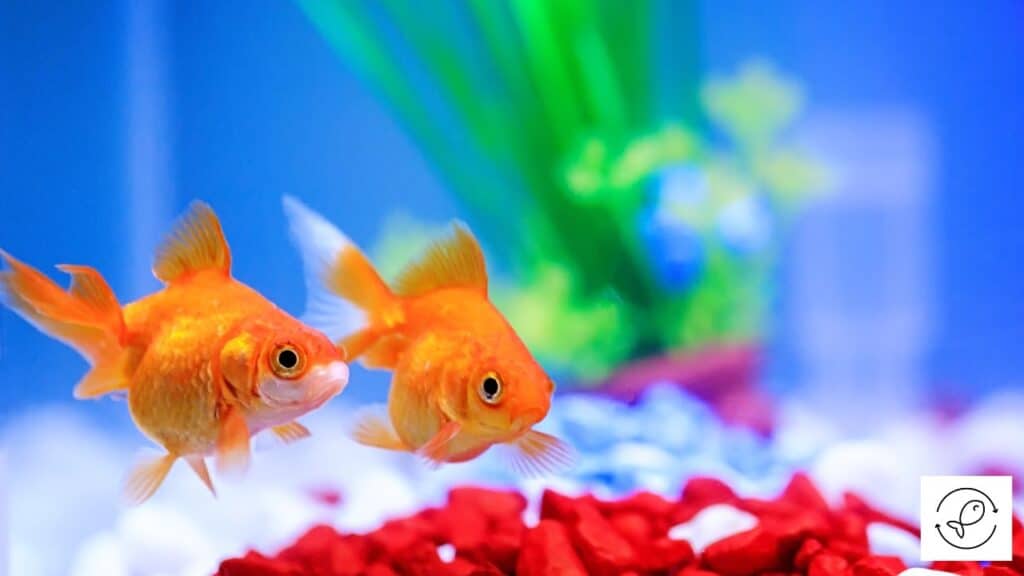Saltwater has a lot more dissolved salt, or sodium chloride, than freshwater. But it’s not just salt; there are other elements dissolved in it too. All of these are found in much larger amounts in saltwater than in freshwater.
We often refer to the amount of these dissolved salts in water as its ‘salinity’ or ‘specific gravity’.
Just like it’s important for us humans to have the right balance of salt in our bodies to stay alive, it’s the same for all living things, including fish.
To understand how the amount of salt in water, or salinity, affects fish, and how fish maintain the salt-to-water ratio in their bodies, we need to learn about two things:
- Osmosis, and
- Osmoregulation.
Osmosis
Osmosis is the process that causes water to move from areas of less salt to areas of more salt.
If a fish is in freshwater, it has more salt in its body compared to the water outside. If a fish is in saltwater, it has less salt in its body compared to the water outside.
This can cause problems for the fish because osmosis causes the water to move from areas of less salt to more salt. Because of this it can cause too much or too little water to go into a fish’s body.
For a freshwater fish, osmosis causes a lot of water to enter their bodies because their bodies have more salt compared to their freshwater environment. For a saltwater fish, osmosis causes their bodies to lose water because their saltwater environment has more salt.
This is also why freshwater fish can’t live in saltwater, and saltwater fish can’t live in freshwater – their bodies just can’t handle the different salt levels. Of course, there are some exceptions to this rule.
Osmoregulation
Fish can be broadly divided into two groups based on where they live – freshwater or saltwater.
Even though they might look similar, these fish have evolved differently to survive in their respective environments, which differ chemically.
Freshwater fish don’t drink much water and produce a lot of diluted urine to maintain the balance of salt in their bodies.
Saltwater fish, on the other hand, drink a lot of water. They get rid of the excess salt by producing a small amount of highly concentrated urine and feces, and also through their gills.
This balance of water in a fish’s body is known as osmoregulation.
It’s important to understand osmoregulation because it affects how fish can live in captivity. Simply put, freshwater fish can’t survive in saltwater and vice versa because their bodies can’t adapt to the change.
However, there are exceptions like sharks and rays. Instead of drinking large amounts of water like other saltwater fish, they keep a high amount of urea (a waste product) in their tissues and blood to prevent water loss.
How Freshwater Fish Maintain Salt-To-Water Ratio in Their Bodies
Freshwater fish live in water that has less salt than their bodies. This means water is always moving into their cells because of the osmosis process explained above.
If the fish didn’t have a way to remove this extra water, they would swell up and possibly burst.
So fish use their kidneys to get rid of this extra water, which comes out as very watery pee.
They also have special cells in their gills that take in salt from the water and put it into their blood. The fish food we give them also has a little bit of salt in it.
The amount of salt that gets into a freshwater fish’s body is very small, so it doesn’t take much effort for the fish to get rid of it.
How Saltwater Fish Maintain Salt-To-Water Ratio in Their Bodies
Keeping marine fish is slightly more challenging than keeping freshwater fish. This is mainly due to the difference in how the two types of fish balance water and salt in their bodies.
Saltwater fish have less salt in their bodies compared to the salty water they live in.
So, they have to drink a lot of water to replace what they lose through osmosis to their saltier surroundings. If they don’t do this, they could dehydrate and perish.
They also pee out a little bit of urine and get rid of extra salt to keep a stable balance of water and salt in their bodies. This process requires a lot of energy, so marine fish need to be well-fed and healthy.
The water quality in a marine fish tank needs to be top-notch since the fish drink a lot of it.
Also, it’s important to avoid sudden changes in the saltiness of the water since it can disrupt the fish’s internal chemistry.
So, while taking care of marine fish requires a bit more work compared to freshwater fish.

